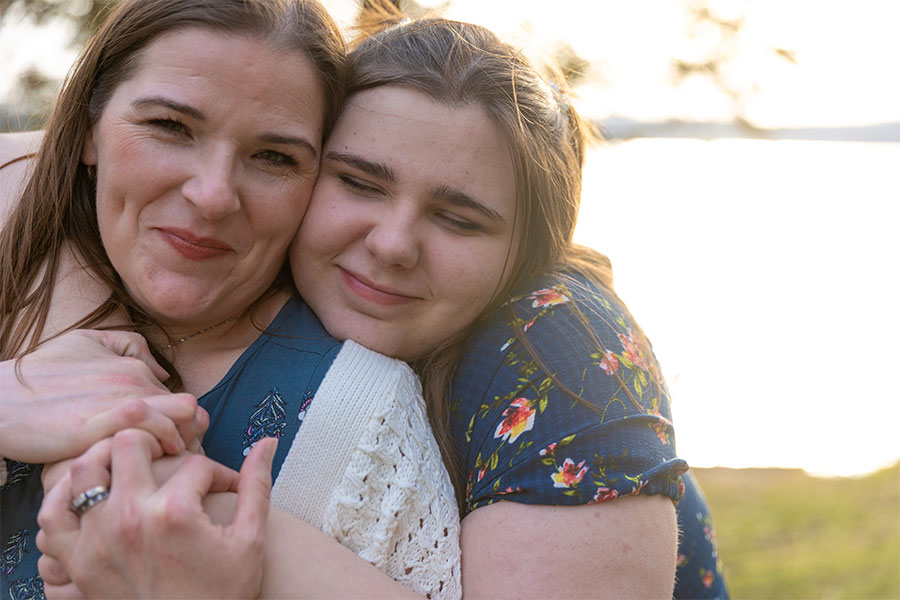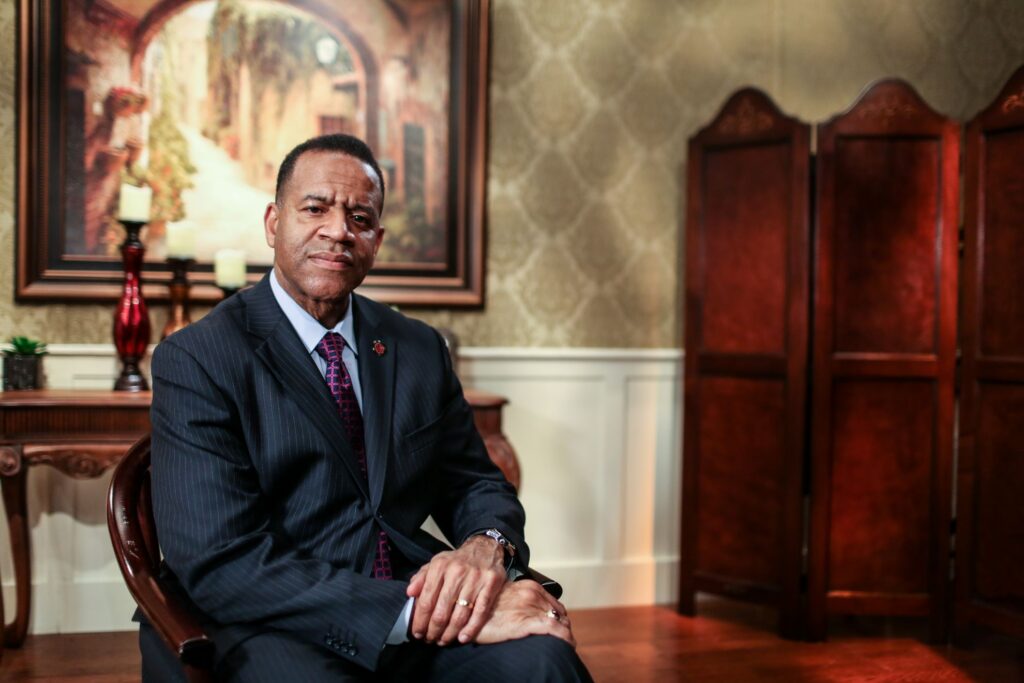
“Family.” It’s a word that gets thrown around a lot to inspire a sense of intimacy and love, regardless of whether someone really is part of one’s family. But strikingly, a 2019 survey showed that the U.S. had the highest rate of children living in single-parent households in the entire world.
The same goes for “marriage.” Marriage has been praised as a right and benefit that should be available no matter who you want to marry. But the last few years represent a record low for the U.S. marriage rate. Recent Census Bureau estimates show that the percentage of households composed of married couples has declined significantly since 1970, from 71 percent of all American households to 47 percent in 2024. In 1968, the vast majority of younger adults ages 25-34 lived with their spouse (upward of 80 percent). But by 2022, that had dropped to 39 percent, while those living with an unmarried partner had grown from virtually none to 16 percent.
Has the value of marriage and family actually changed? Or just our ideas about it?
There’s obviously a disconnect somewhere.
What is family?
The family is the building block of society. The individuals within a family are connected by a bond more foundational than just a legal one. A couple’s marriage license and a child’s birth certificate are there to protect something more basic to human existence than the law itself. In fact, that sacred bond goes back to the point of government in the first place: the state exists to serve people, not the other way around. Families pre-exist the state. Children belong to their families, not the government.
Family is important. The work of bringing up children, honoring one’s parents, and being a good spouse may not have the social clout or financial payout of climbing the corporate ladder. But the joy and pain of relationships, the influence of our families, and the tenor of our home life go with us beyond the domestic scene, no matter our family’s income.
Human beings aren’t as compartmentalized as today’s world would have us think. Our families – parents, children, and spouses too—shape our character, how we work in our jobs, choose our hobbies, and more. Those closest of relationships demonstrate the biblical principle “as iron sharpens iron, so one person sharpens another” (Proverbs 27:17).
And people shape the world, as far as God gives us the power to shape it. We sometimes speak as if businesses, corporations, cultures, and nations “evolve” along a course of their own. But it’s people and their ideas that drive those entities down their paths, whether they are aware of it or not.
What is marriage?
For much of human history, across cultures, governing authorities protected a specific relationship in the law: the union of man and woman, for life. This relationship is unique. When a man leaves his father and his mother and holds fast to his wife (as Genesis puts it), unity is found in diversity, and children can be conceived.
Marriage is certainly more than a legal certificate. But the legal certificate has a function too: it affords that relationship important benefits and protections, such as tax breaks, and an incentive to stick it out when things go wrong. As a legal institution, marriage has existed to channel the potential of a man-woman physical relationship—the only relationship that produces children—in a committed union.
That’s for the benefit of children and society. It might sound unromantic, but the institution of marriage is about social health and making sure children can be raised in their families, something that’s good for everyone. It’s well documented that marriage benefits children: children raised outside a stable family unit led by their parents often experience higher rates of negative outcomes.
While marriage is no walk in the park, it doesn’t just provide benefits to children. Many studies attest to the benefits to the married couple: for example, a 2022 study suggests that marriage between a man and a woman, as opposed to mere cohabitation, is linked to better physical and mental health.

Strong families come about when a husband and wife persevere through hard times and model to their children the love, forgiveness, and healthy priorities that sustain a good marriage. And strong families create a free and stable society. That society, in turn, encourages strong marriages, which create strong families. Valuing marriage and family creates a feedback loop of flourishing.
Confusion about marriage and family
Today we live in a culture that is deeply confused (perhaps we could say “disenchanted”) when it comes to marriage and family. Concerns about finances and fear of overpopulation result in adults writing callous articles that would make a thoughtful child quake in her boots and question whether she’s truly loved and ought to exist. The Pew Research Center reports that as of 2023, younger adults between 18 and 29 years old find “having a lot of money” of high importance for living a fulfilling life. That’s in stark contrast to the prayer of the wise in Proverbs 30:8-9: “give me neither poverty nor riches; feed me with the food that is needful for me, lest I be full and deny you and say, ‘Who is the Lord?’ or lest I be poor and steal and profane the name of my God.”
For all our culture’s repetition of the word “family,”, the most hands-on, up-close care of one’s own children has been relegated to a fairly low place in social priorities: stay-at-home parents don’t make money. The implication is that the only way to be a true “contributor to society” is to do something that brings in a financial profit. When both parents have prioritized pursuing their occupational dreams over family, children are sometimes seen as robbing these adults of “being themselves.”
Marriage and family versus ‘being yourself’
These young adults grew up amid a flurry of beloved children’s movies in which “following your dreams,” which relates closely to “being yourself,” is also prioritized above family. Those values usually don’t play out in the plot as “accept your given talents and enjoy doing what suits you” (with the exception of Tinkerbell, 2008). Instead, it’s something more like “do what you want, no matter how crazy other people think it is” (for one of many, there’s Planes, 2013). The call to “be yourself” isn’t just a call about occupation.
It’s a familiar storyline: if the dreamer’s family members don’t believe in the dream, they are shown to be sticks in the mud, narrow-mindedly ignorant of the great potential of the dreamer and the human race in general. Disobedience and deception are demonstrated as steps in the path to achieving the dream—Moana (2016), The Little Mermaid (1989/2023), etc. These are the models moviemakers have given to children, to young girls in particular.
However fun it may sound for a while, ordering life around money, or a philosophy of “do what you want even if other people think it’s crazy,” doesn’t lead to fulfillment. The result is a culture that pushes children away from getting counsel from their parents, who (chances are) know them better than they do—and certainly know them better than the state does. And if “being yourself” is the highest value, individuals’ desires are conflated with their identities, teaching us that those desires are more important to who we are than our closest relationships—and perhaps more important than nearly anything else. Enter gender ideology.
Gender ideology threatens the family
Right now, gender ideology represents a grave threat to society’s health and freedom, and a clear outplaying of the damaging lies in our culture. Gender ideology rejects the human body’s God-given nature as either male or female, ranking desires above reality. Divisively pushed on children, this system of thought threatens the well-being of families by driving a wedge between children and their parents, and further confuses people about the value of the body.
Detransitioners Chloe Cole, Helena Kerschner, and Keira Bell all rejected their identities as women and obtained surgical or hormonal interventions during their teenage years to appear as men. But they’ve grown up, and looking back, they and many others are speaking up against what was done to them. The fact is that our culture is subjecting young people to ideologically driven procedures (which have no evidence of long-term benefit to those who receive them).
Europe, years down the road from the United States, has seen multiple countries curtail these hormonal and surgical attempts at gender transition on minors. No more children should be sent down the deceptive path of puberty blockers, cross-sex hormones, and the removal of healthy body parts—which is permanently damaging and can be sterilizing.
When culture and law fail to respect and promote the bonds of family and the rights of parents, countless individuals (particularly women, children, and those in poverty) suffer needless hardships.
ADF work dealing with gender ideology
Alliance Defending Freedom champions the truth that marriage and family matter and that they ought to be protected in law. In standing against the harms of gender ideology, ADF seeks to stop the needless harm that comes from rejecting the truth. Here are a few areas in which we’re challenging government officials and activists pushing gender ideology:
‘Secret social transition’ cases
Parental rights, rooted in that foundational family relationship, pre-exist the government: they’re based in the inherent dignity and freedom of persons and God’s created order, with the family as society’s building block. ADF is litigating multiple cases around the country that deal with “secret social transitioning” in schools, a major threat to parental rights.
- In New York, school officials deceived a mother about the fact that they were treating her seventh-grade daughter as a boy, leading the mother to sue the school.
- Similarly, in Michigan, a couple sued their middle-school daughter’s former school for treating her as a boy without their knowledge, and intentionally concealing their actions. The couple only found out what was happening when a school official accidentally left a document partially unaltered, showing the masculine name and male pronouns the school was using for the girl.
- In Wisconsin, ADF and the Wisconsin Institute for Law and Liberty won a case on behalf of a mother who turned to legal action when school officials refused to respect her wishes to treat her daughter as a girl.

All these cases highlight both the importance of parents’ role in raising their children and the disregard for that role within the school system in favor of gender ideology.
Laws protecting children from ‘gender transition’ procedures
As of 2024, across the country, 26 states have passed laws that protect children from unnecessary and harmful “gender transition” procedures. ADF is helping Alabama defend its law against a challenge brought by the Biden administration and politicized interest groups.
After all, the medical field exists to promote health and human flourishing, not ideological fads that push irreversible drugs and surgeries on struggling children. The overwhelming majority of children will naturally resolve their dysphoria as they grow—as long as no one interferes with the course of puberty. These laws reflect the truth that every person is made either male or female, and interfering with that fact doesn’t help anybody.
Title IX cases
The Biden administration released its final rule changing the definition of “sex” to “gender identity” in federal education law in May 2024, to take effect Aug. 1, 2024. Should the administration succeed, the result would be schools across the country being forced to allow males in girls’ restrooms, locker rooms, and hotel rooms.
Teachers and students could face punishment for speaking up about the fact that boys are not girls and girls are not boys. After the final rule was released, ADF filed five lawsuits representing students, teachers, female athletes, schools, and states to put a stop to this federal overreach.
In Section 1557 of the Affordable Care Act, a new rule parallel to the Title IX rule requires doctors and medical professionals to act against their sound medical judgment and perform harmful “gender transition” procedures, even on children.
That applies to any doctors who care for patients who pay through Medicaid or the Children’s Health Insurance Program (CHIP). The new rule also requires insurance plans to pay for these harmful procedures and the rule violates the free speech of doctors by forcing them to lie to their patients about the reality of biological sex and use inaccurate pronouns. ADF represents medical associations and a Mississippi clinic that are standing up for their oath to “do no harm.”
Foster care cases
ADF is also working against a trend of adoption and foster policies that use a gender ideology litmus test to determine which parents are allowed to care for vulnerable children. ADF is defending Shane and Jenn DeGross, longtime foster parents in Washington who were denied renewal of their foster care license in 2022 because they expressed to department officials that they could not promote gender ideology to a hypothetical child.
Similarly, two experienced foster families in Vermont had their licenses revoked because they could not endorse the state’s preferred views on gender by agreeing to use inaccurate pronouns or take children to events like pride parades.
In both cases, the families had been model parents for years, and in Vermont the families had already adopted five children from foster care between them. Issues surrounding gender dysphoria had never been an issue for any of their foster children; rather, the state required the families to agree to the state’s ideology just to remain eligible to retain their licenses.
Conclusion
Family is important. Marriage is important. And love is important. They’re more valuable than the doomed pursuit of money, and more foundational than the chimera of self-definition, as we find in the Obergefell v. Hodges decision that forced states to recognize same-sex unions as marriages. The dreamy pretense that “defining and expressing one’s identity” leads to true fulfillment is fundamentally flawed, because the world doesn’t find its sustenance by eating fortune cookies or by following the Disney exhortation to “be yourself” and wish upon a star. Self-focused philosophies miss the fact that humans are meant to live in loving and humble relationships with God and each other—not captive to our own desires above all else.
We live in a real world; what’s good and wonderful, like marriage and family, is worth defending from real threats. So we can’t always be glib and sentimental in how we understand these amazing, joyful, and romantic things, especially in how they get treated by the law. There’s a time for dreaming and a time for reasoning. It’s time we stop subscribing to the insufficient and fluffy ideas that got us to where males are dominating women’s sports.
Marriage, between one man and one woman for life, benefits the family and society in ways no other relationship does. That’s one reason the government provides benefits for this relationship and why ADF is standing up for it. It’s not as if the very nature of how societies and individuals work has evolved in the last hundred years. The feedback loop of flourishing hasn’t changed, though our ideas and our technologies have. Strong marriages and strong families still form the foundations for a healthy society and individuals. They benefit children and adults alike. Let’s stand on the truth that God’s design for us is good—and that design means flourishing for everyone.




